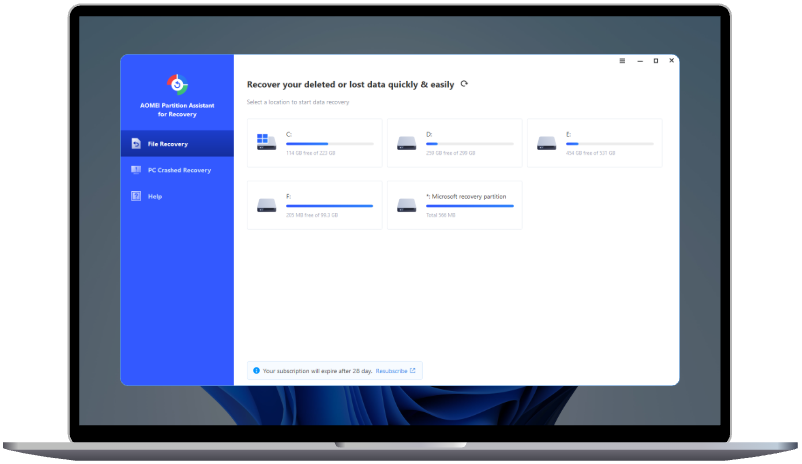Desktop Data Recovery: How to Recover Data from Desktop Computer
Desktop data recovery means restoring lost or deleted files from your desktop. In this article, you will get the best desk recovery software to help you get the lost files back from the desktop folder.
About desktop data recovery
Desktop data recovery refers to the process of retrieving lost or deleted files, folders, or data from the Desktop folder on your computer. This folder acts as a convenient location where users often store important documents, images, videos, and other files for quick access.
Data loss from the Desktop can occur due to various reasons, including accidental deletion, hardware or software failures, system crashes, malware or virus attacks, and human errors. When such data loss happens, it can be distressing, especially if the files are essential for work, personal use, or sentimental value.
To recover lost data from the Desktop, users can employ various methods, such as using built-in recovery options provided by the operating system, relying on file backup systems, or utilizing third-party data recovery software. The effectiveness of the data recovery desktop process depends on the cause of data loss, the actions taken after the loss, and the tools or services used for recovery.
It's essential to act promptly after data loss to increase the chances of successful recovery. Additionally, adopting regular data backup practices can serve as a preventive measure against permanent data loss and offer peace of mind in case of any unforeseen incidents.
Download the best desktop data recovery software
When data loss occurs, and users need to recover files from the desktop on Windows 10 computers, especially those who haven't taken backups, relying on reliable data recovery software like AOMEI Partition Assistant for Recovery proves to be a highly effective solution.
AOMEI Partition Assistant for Recovery offers robust features tailored for recovering a wide range of file types, including deleted and lost MS Office files, folders, compressed files, photos, videos, audio, and more from various storage devices like HDDs/SSDs, USB drives, and SD cards.
Key features of AOMEI Partition Assistant for Recovery include:
◤ Powerful Data Recovery: AOMEI Partition Assistant for Recovery is equipped to handle the recovery of diverse file types from different storage devices, offering a comprehensive data recovery solution.
◤ Convenient Search: The Quick Scan and Deep Scan processes enable users to easily find their desired folders by using specific parameters such as Path, Filename, Date, and more.
◤ Retention of Original Attributes: During the recovery process, AOMEI Partition Assistant for Recovery ensures that the retrieved files retain their original Path, Filename, and Format, allowing for straightforward identification and organization.
◤ Wide Compatibility: AOMEI software supports multiple file systems, including NTFS, FAT32, exFAT, and ReFS, ensuring seamless compatibility with various storage devices.
By using AOMEI Partition Assistant for Recovery, users can efficiently realize desktop hard drive data recovery without the need for pre-existing backups. Its user-friendly interface and powerful recovery capabilities make it a valuable tool for retrieving crucial files.
How to recover data from your desktop computer?
Here is a step-by-step guide on how to use the software for desktop data recovery:
Step 1. Install and launch AOMEI Partition Assistant for Recovery. Choose the exact partition or disk where your data lost and click Scan.
Step 2. Then, the recovery tool start to scan and search. lt will execute the “Quickly Scan" first for finding your deleted data fast, and then execute the “Deep Scan" for searching other lost data.
Step 3. Once the scan is completed, all deleted files, recycle bins and other missing files will be displayed. Please select the file you would like to recover and then click "Recover".
Step 4. Then, select a folder path to save your recovered files.
Step 5. Initiating the recovery process will start transferring data to the selected destination folder. Once the recovery is successful, your data will be safely saved in the specified location.
By following these steps, you can effectively recover your lost or deleted files from the chosen hard drive using the software. Remember to be patient during the scanning and recovery process, as it may take some time depending on the size and complexity of the data being recovered.
Conclusion
If you lost the files stored on your desktop and don't have any backup in advance, you can read this post to learn how to perform a desktop data recovery. As you can see, AOMEI Partition Assistant for Recovery proves to be a valuable and versatile tool for Windows users to restore their lost files efficiently.

